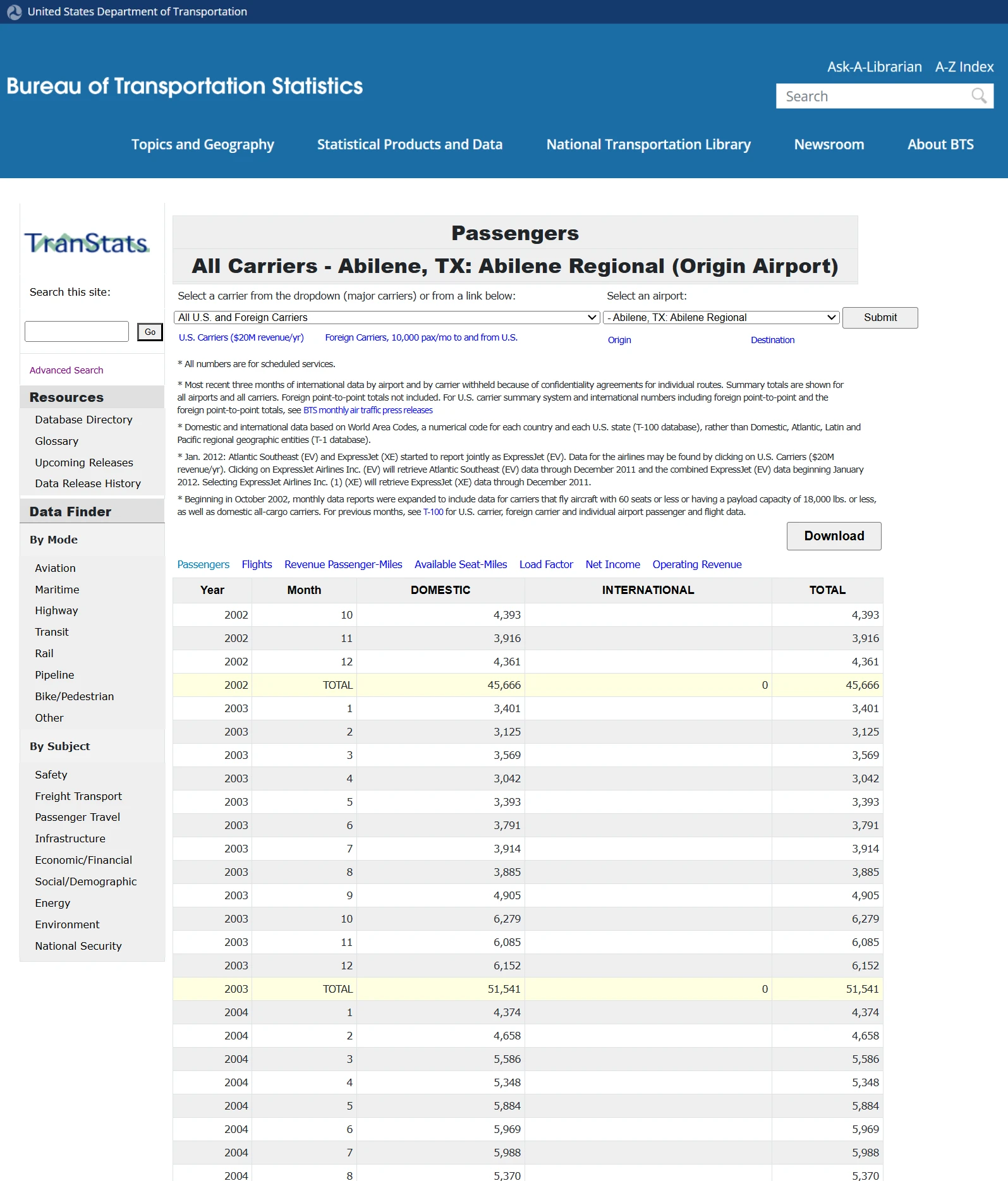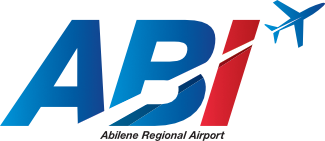ABI Insights
Your window into the data and strategy shaping air service at Abilene Regional Airport
Introduction to ABI & Air Service Development
About Abilene Regional Airport
Abilene Regional Airport (ABI) is a commercial service airport located just minutes from downtown Abilene, Texas. ABI currently offers five daily commercial departures and arrivals, with nonstop service to Dallas-Fort Worth International Airport (DFW) provided by American Airlines, operated by its regional partner Envoy Air, and United Airlines. From DFW, travelers can connect to hundreds of destinations across the U.S. and around the world.
ABI is also home to Eagle Aviation Services, Inc. (EASI)—a major maintenance facility for Envoy Air, which operates American Eagle flights. This facility provides essential maintenance for the airline’s regional jet fleet and plays a key role in operational support. Its presence contributes to the consistency and stability of ABI’s air service within American’s regional network.
Most of ABI’s flights are currently operated on the Embraer 175, a dual-cabin regional jet that features both first-class and economy seating. Typically, four of ABI’s daily flights use the E175, while one flight operates on the Embraer 170, an earlier-generation model with similar capacity and performance.
These dual-cabin aircraft are part of a broader airline strategy to offer upgraded amenities and a more comfortable experience for regional travelers. For ABI, they also bring operational benefits such as increased seating capacity, greater fuel efficiency, and compatibility with high-volume hub airports—helping position ABI as a reliable and connected regional partner in the American Airlines network.
ABI offers travelers a comfortable, easy-to-navigate terminal with close parking and short wait times—making it a convenient option for both business and leisure travel.
Why Air Service Matters to Our Region
Abilene Regional Airport is more than a point of departure—it’s a vital part of the region’s transportation infrastructure and economic engine. According to a 2018 economic impact study conducted by the Texas Department of Transportation (TxDOT), ABI supports approximately 2,649 jobs, contributes $112.6 million in payroll, and generates over $362 million in total economic output.

Texas Aviation Economic Impact Study
Download the Texas Aviation Economic Impact Study.
(Approximately 3.7mb download)
These figures reflect both direct employment and the ripple effects of airport-related activity across the local economy—from tourism and freight movement to construction and business travel.
ABI’s impact also extends to regional safety and emergency response. In partnership with the Texas A&M Forest Service, ABI supports aerial firefighting operations statewide. An expanded wildfire response base is being established at the airport, enhancing Texas’ ability to respond quickly to wildfires and other natural disasters across West Texas and beyond. This investment underscores ABI’s role as a critical hub for public safety.
In addition, ABI is home to a diverse mix of aviation, logistics, educational, and transportation tenants. From corporate aviation and express cargo services to flight training, car rentals, and technical education, these partners contribute meaningfully to daily airport operations and long-term regional development.
Beyond its economic and operational functions, ABI remains actively engaged with the public through community events, airshows, and educational outreach. The airport’s connectivity also supports regional employers, attracts visitors, and links Abilene to national and international markets.
Investing in air service and airport infrastructure not only enhances travel convenience—it ensures continued resilience, economic opportunity, and community access for years to come.
ABI Tenants Supporting Regional Aviation
ABI is home to a range of aviation, logistics, and ground transportation partners that contribute to the airport’s economic footprint and operational vitality.
Eagle Aviation Services, Inc. (EASI), a wholly owned subsidiary of American Airlines Group, operates a full-service Maintenance, Repair, and Overhaul (MRO) facility at Abilene Regional Airport. With five hangars and a 24/7 operation, EASI specializes in heavy maintenance for American Eagle regional aircraft. The facility employs more than 400 personnel, the majority of whom are FAA-certified Airframe and Powerplant (A&P) mechanics. Additional support staff work across quality assurance, logistics and parts management, production control, and administrative functions—making EASI a critical hub in the national regional aviation maintenance network.
Freeman Jet Center provides a full range of Fixed Base Operator (FBO) services, including fueling, hangar space, aircraft maintenance, and concierge support for general aviation and corporate aircraft. Their 24/7 presence ensures that private and charter flights have reliable, professional ground services available around the clock.
FedEx operates a cargo facility on the airfield that supports the timely movement of express packages and freight across the region. Their presence enhances regional logistics capacity and helps local businesses connect to national and international supply chains.
TSTC (Texas State Technical College) operates an aviation program at ABI that helps train the next generation of aircraft technicians and aviation professionals. Their programs support workforce development and contribute to the long-term sustainability of the region’s aviation industry.
ABI is also served by several nationally recognized car rental agencies located onsite, offering travelers convenient ground transportation options upon arrival. These companies—including Avis, Payless, Enterprise, National, Hertz, Thrifty—provide flexible choices for both business and leisure travelers and support seamless mobility throughout the region.
Lytle Aviation is a FAA Part 61 flight school offering personalized flight instruction and introductory flights for aspiring pilots. Their programs support both recreational flyers and those beginning their journey toward a professional aviation career in the Big Country.
EAA Chapter 471, a local chapter of the Experimental Aircraft Association, is also based at ABI. The chapter promotes hands-on aviation education, fosters a community for those passionate about flight, and engages the public through programs like Young Eagles, which offers free flights to youth. Their presence at ABI underscores a strong commitment to inspiring the next generation of pilots and aviation enthusiasts.
These tenants—along with others at ABI—help diversify airport activity, create local jobs, and strengthen Abilene’s role in the broader aviation ecosystem.
Skyline Aviation Training Academy operates in Abilene and San Angelo, providing FAA Part 141 and Part 61 pilot training for both fixed-wing and rotorcraft students. As Angelo State University’s exclusive flight training partner, Skyline strengthens ABI’s role in regional aviation education, workforce development, and economic growth.
Turbolyft delivers cutting-edge avionics, completions, and helicopter modernization at ABI, supporting operators with custom engineering and its proprietary Y-Series product line. Operating in Abilene, Texas, as well as Burlington, Washington, and Pitt Meadows, British Columbia, Turbolyft enhances regional rotorcraft capabilities through specialized modifications and mission-focused upgrades.
2024 Passenger Growth
In 2024, ABI experienced continued growth in commercial air travel:
- Enplanements (departing passengers): 99,338 (+19% over 2023)
- Deplanements (arriving passengers): 96,898 (+21% over 2023)
- Total passengers: 196,236
ABI’s average load factor in 2024 was 72.1%, based on DOT T100 segment data, reflecting steady and efficient use of available airline seats throughout the year.
2025 Progress Update
Abilene Regional Airport continues to see strong growth in 2025, reinforcing the importance of local travel and the strength of our regional demand.
As of June 2025, roundtrip passengers are up 9.8% year-to-date compared to the same period in 2024 (DOT T100 segment data).
This encouraging momentum builds on 2024—one of ABI’s strongest years on record—and helps demonstrate to airlines that our community is showing up and filling flights. Every local boarding adds to the case for expanded air service and future route development.
Your decision to fly local is making a measurable impact.
Why Passenger Choice Matters
While infrastructure improvements help prepare ABI for long-term growth, the most impactful factor in attracting new routes is how often our community chooses to fly ABI today. When travelers drive to other airports—such as Dallas or Austin—that activity is counted in those cities’ statistics, not Abilene’s. This is known as passenger leakage, and it can significantly weaken ABI’s case when airlines assess local demand.
At the same time, maintaining modern airport facilities ensures that current operations run efficiently, supports compliance with safety and accessibility standards, and provides a positive travel experience for today’s passengers. These improvements help ABI remain competitive and responsive to the needs of both airlines and the flying public.

Passenger & Operations Data
What you’ll find:
- Monthly and annual passenger enplanements and deplanements
- Load factors
- Total available seats
- Total cargo
- Total parking lot revenue
- Total rental car revenue
- Total rideshare revenue
ABI Statistics:
Community Catchment Area & Market Analysis
What you’ll find:
- ABI’s catchment area: who we serve and where they travel
- Data on local travel demand (including leakage to other airports)
- Regional population and business trends that influence air service
- Links to key documents and additional resources
Why it matters:
Airlines want to know who will use a flight. This section outlines our region’s potential and real-world behavior when it comes to air travel.

ABI Catchment Area Leakage Study 2019
Download the ABI Catchment Area Leakage Study document for 2019.
(Approximately 7.8mb download)

Bureau of Transportation Statistics – TranStats
A federal database of airline data including passenger counts, load factors, route performance, and other metrics used by airlines and airports to evaluate market demand and operational trends.
- Open the Bureau of Transportation Statistics website.
- From the drop-down for 'Find an Airport', scroll down until you find, 'Abilene, TX: Abilene Regional'
- Click 'Submit'
Frequently Asked Questions
What you’ll find:
- Common questions and answers about airport data and air service decisions
- Clarifications on how service is added and why it sometimes changes
Why it matters:
We know air service is important to the community, and we want to be transparent about how we advocate for new air service. This section addresses the most common questions with clear, factual responses.
Air Service Decisions
Q: How are new airline routes added at ABI?
Air Service Decisions
Q: How are new airline routes added at ABI?A: The decision to add a new route is made by the airline. Airlines evaluate many factors, including market demand, revenue potential, aircraft and crew availability, operating costs, and how a route fits into their overall network.
At ABI, our team works proactively to attract new service by sharing data that demonstrates passenger demand, travel behavior, and the region’s economic activity. We also provide detailed route forecasts and analyses to help airlines evaluate the viability of new destinations.
While we don’t control the final decision, we are continually engaged in making the strongest case possible for expanded service.
Air Service History
Q: Has ABI had other airlines or destinations in the past?
Air Service History
Q: Has ABI had other airlines or destinations in the past?A: Yes, ABI has previously had service from multiple carriers and to destinations such as Austin and Houston. Over the years, the airport has seen a variety of routes based on airline strategies, passenger demand, and industry conditions.
A major shift occurred after the Airline Deregulation Act of 1978, which removed federal control over airline routes and pricing. Since then, airlines—not the federal government—have had full authority to decide which cities they serve based on profitability and network planning. While certain programs (like the Essential Air Service program) still subsidize flights in very rural areas, most communities—including Abilene—no longer receive direct federal support for commercial air service.
In recent years, factors like route consolidation, pilot shortages, and fleet availability have all contributed to reduced service in many regional markets.
Current Service
Q: Why does ABI only have service to Dallas right now?
Current Service
Q: Why does ABI only have service to Dallas right now?A: American Airlines, through its regional partner, currently provides daily service to Dallas-Fort Worth International Airport (DFW). DFW is one of the largest airline hubs in the world and consistently ranks among the top three busiest airports in the United States. Located just 180 miles from Abilene, it provides convenient access to hundreds of domestic and international destinations.
Given ABI’s size and proximity to such a major hub, Dallas remains the most practical and high-demand route for connecting travelers from Abilene to the rest of the country—and the world. The presence of Eagle Aviation Services, Inc. (EASI) ↗ at ABI—a major maintenance facility for Envoy Air’s regional fleet—also helps support continued service by providing a critical operational base for the airline.
Fare Pricing
Q: Why are flights from Abilene sometimes more expensive than from other airports?
Fare Pricing
Q: Why are flights from Abilene sometimes more expensive than from other airports?A: Airline pricing is dynamic and based on many variables—including demand, time of booking, seat availability, route profitability, and national network strategy.
Flights from smaller regional markets like ABI often appear more expensive due to limited competition and broader industry factors like pilot shortages and airline consolidation.
Booking early—ideally 30+ days in advance—is one of the most effective ways to unlock competitive fares. Prices typically rise closer to the travel date, especially in markets with fewer daily flights.
We also encourage travelers to consider the full cost of travel. Driving to another airport may seem cheaper based on fare alone, but when you add in gas, tolls, hotel stays, parking fees, and lost time, the overall cost is often much higher than expected.
Choosing to fly from ABI not only supports the local economy—it strengthens our case with airlines for future service expansion. Every boarding pass from ABI helps demonstrate real demand and keeps us moving forward.
Future Growth
Q: Is ABI working to bring in more destinations?
Future Growth
Q: Is ABI working to bring in more destinations?A: Yes. The airport is continuously working to attract additional air service and is currently in discussions with airlines regarding potential routes to hub cities like Houston and Denver, as well as leisure destinations in Florida, Las Vegas, and Southern California.
These conversations are informed by a wide range of data, including passenger travel patterns, regional economic activity, airport usage, and projected route performance. We also share insights about how travelers in our area are currently accessing air service—including how many drive to other airports and where they fly most often.
While airlines ultimately make the decision to launch new routes, ABI remains committed to providing accurate, detailed information to help them evaluate Abilene’s potential as part of their network.
Broader Airport Role
Q: Does ABI support more than just airline travel?
Broader Airport Role
Q: Does ABI support more than just airline travel?A: Yes. ABI is home to a range of tenants—including cargo operators, aircraft maintenance providers, technical education programs, and community aviation groups. These partners enhance ABI’s value as a regional aviation hub and contribute to economic development, public safety, and workforce training across the Big Country.
Community Impact
Q: What role does the community play in attracting new service?
Community Impact
Q: What role does the community play in attracting new service?A: A major one. Airlines look closely at passenger data when deciding where to add or expand service, and that data is based on where people actually board their flights. When travelers drive to other airports—like Dallas or Austin—that demand is recorded in those cities, not in Abilene.
So even if someone lives in the Big Country, their air travel activity only supports ABI’s case if they fly out of ABI.
Community support—including choosing to fly locally when possible—helps demonstrate real, trackable demand to airlines. The more people who use ABI, the stronger and more competitive our case becomes for additional destinations in the future.
Every boarding pass from ABI sends a message: This region supports local air service.
Download the ABI Catchment Area Leakage Study document for 2019.
(Approximately 7.8mb download)
Industry Realities
Q: Why do airlines sometimes leave smaller markets?
Industry Realities
Q: Why do airlines sometimes leave smaller markets?A: Airlines regularly review and adjust their route networks based on a combination of national and global factors. These include profitability, staffing levels (especially pilots and crew), aircraft availability, fuel costs, and evolving passenger travel patterns.
In recent years, industry-wide challenges such as regional pilot shortages, fleet restructuring, and increased operational costs have led many airlines to consolidate service into larger hub airports. As a result, smaller regional markets across the country—not just Abilene—have experienced reductions in service or fewer destination options.
ABI, like many regional airports, is part of a much larger network. Airlines have to make decisions that align with their overall system performance and long-term strategy, which means even communities with strong local support can be affected by changes far beyond their control.
That said, ABI continues to make the strongest case possible for service retention and future growth by sharing local data and demonstrating ongoing community support.
Financial Tools
Q: What are ways ABI and other airports attract and incentivize new air service?
Financial Tools
Q: What are ways ABI and other airports attract and incentivize new air service?A: Airports can use several tools to help reduce the financial risk airlines face when entering a new market or adding a new destination.
- Incentives: ABI has an incentive policy that allows airlines to receive up to two years of waived airport rent and fees for new service. This can amount to several hundred thousand dollars in savings, helping strengthen the launch of a new route.
- Marketing Support: ABI offers a marketing program that can be used to promote a new airline or service offering.
- Minimum Revenue Guarantee (MRG): An MRG is a financial tool sometimes used in smaller markets to support new airline service. It guarantees a minimum level of revenue for a set period. If the actual revenue falls short, the MRG covers the gap up to an agreed-upon limit. While this can make it more feasible for an airline to test a new route, it does not guarantee long-term service—sustained passenger demand is still essential.
Grants & Infrastructure
Q: How do Federal Aviation Administration (FAA) grants relate to air service at ABI?
Grants & Infrastructure
Q: How do Federal Aviation Administration (FAA) grants relate to air service at ABI?A: Federal Aviation Administration (FAA) grants do not directly fund commercial air service or influence airline route decisions. Instead, they typically support airport infrastructure projects—such as terminal improvements, runways, taxiways, safety systems, and other capital needs.
These improvements play an important behind-the-scenes role. A well-maintained, modern, and efficient airport can better support current operations and prepare for future demand, making it easier to accommodate airline schedules and serve passengers effectively.
That said, airlines independently determine where they operate based on their own business models, national network strategies, and passenger data. FAA grants help ensure ABI is positioned to serve the region well, but they are not connected to adding or sustaining routes.
Daily operations, routine maintenance, and customer service at ABI are supported by local funding sources—such as parking revenue—not by FAA grants.
Stay Engaged
For media inquiries or detailed data requests, please contact the airport directly.
Send us a message:
We’re committed to open communication and sharing meaningful updates with our community. Thank you for your interest in ABI’s future.
For questions related to the terminal expansion and improvements, visit iflyabi.com/abinext or email us at abinext@abilenetx.gov.


